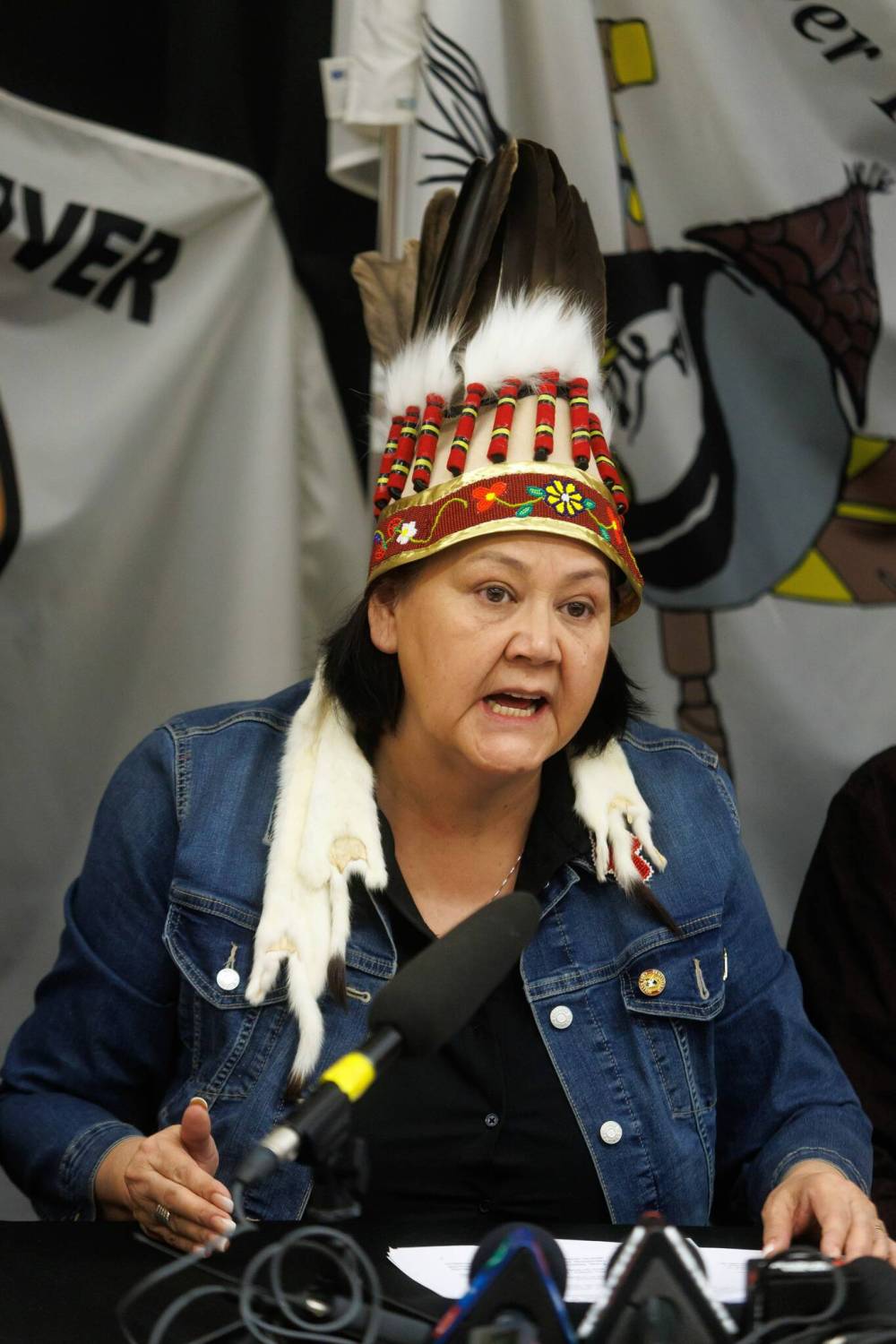Moments after winning re-election as Grand Chief of the Assembly of Manitoba Chiefs, Cathy Merrick of Pimicikamak Cree Nation was clear in who she wants to build relationships with first.
“There’s a lot of issues that we have to deal with when it comes to First Nations in Manitoba,” Merrick announced. “First and foremost is with the provincial government.”
This is notable because the primary relationship for First Nations in Canada is with the Crown — whose main proxy is the federal government, not the provinces.

MIKE DEAL / FREE PRESS file
Moments after winning re-election as Grand Chief of the Assembly of Manitoba Chiefs, Cathy Merrick of Pimicikamak Cree Nation was clear in who she wants to build relationships with first.
Merrick’s statement makes sense because, arguably, the issues most concerning to First Nations — education, infrastructure, health — are under the jurisdiction of provinces.
It makes even more sense in Manitoba, where Premier Wab Kinew shares the role of being both the leader of the government and the minister of indigenous reconciliation.
But, ties between AMC and the Manitoba government need a bit of work.
Particularly, the relationship between Merrick and Kinew.
Any Manitoba premier and a grand chief of AMC will always be at odds.
Last March, for example, Merrick said she was “profoundly disappointed” when AMC “was not consulted” on Kinew’s provincial bail reform plan.
If I had a dime for every time a premier neglected to speak to Indigenous leadership on issues impacting Indigenous peoples I’d be rich.
Merrick’s “profound disappointment” however has turned into some very public conflicts between her and the Manitoba premier.
There’s the issue of the Lake Manitoba and Lake St. Martin Outlet Channels Project, which Kinew inherited from Brian Pallister’s PC provincial government.
In an op-ed published in the Free Press last January, former AMC acting grand chief Cornell McLean remarked that First Nations impacted by the 23-kilometre-long flood-diversion projects were not consulted, nor would be protected under the plan.
Then came a report last April by the Impact Assessment Agency of Canada which claimed the projects are “likely to cause significant adverse environmental effects” and “residual environmental effects to species at risk that are of cultural importance to Indigenous groups, including from habitat loss and effects to wildlife health and mortality.”
Merrick, commenting at a press conference with McLean on the report, called on a renewed consultation process based on the United Nations Declaration on the Rights of Indigenous Peoples — something Kinew regularly voices his commitment on.
Yet, any changes to the projects puts Kinew in a difficult position.
Not only would a renewed consultation process delay initiatives intended to address expensive flood damage for the province, the Manitoba premier has previously committed to the outlet diversions and wants them built immediately.
While opposition leader in 2022 he said: “PC disorganization and stubborn attitude mean Manitoba is nowhere close to even starting construction. It’s time the PCs rolled up their sleeves and got this thing done.”
Then, there’s the close relationship between Kinew and Manitoba Métis Federation President David Chartrand.
Since being elected, Kinew has actively courted support from the MMF, appearing at the organization’s gatherings to voice support for Métis rights, leadership in cabinet and recognize Louis Riel as Manitoba’s “first premier.”
Kinew then signed a memorandum of understanding this month to give the MMF nearly 100 acres of land where the community of Ste. Madeleine once existed.
The announcement came as a shock to First Nations leaders, who say their rights are violated because these are their traditional lands.
Merrick’s position on this is clear. A year ago, in a related issue, she said that: “It is concerning that the federal government has recognized the “Historic Métis Homeland” as an area encompassing the traditional territories of many First Nations, including the entirety of what is now the province of Manitoba. The Métis claim to territory is relatively new, benefiting from the concept of the Doctrine of Discovery and lacks the historical significance that First Nations share with the land.”
Then came the Prairie Green Landfill search for the remains of Morgan Harris and Marcedes Myran — an issue that helped Kinew win last October’s provincial election.
In March, Merrick led a rally on the steps of the Manitoba legislature shaming the provincial government’s inaction, saying: “We are going to quit begging. No more begging.” She condemned Kinew to much applause, announcing: “Do the f—-ing work.”
Kinew was notably agitated responding to Merrick’s comments with media but, a few weeks later, announced that the Manitoba and federal governments would each commit $20 million to fund the search — a significantly smaller amount than the $90 million to $180 million AMC claims the search will cost.
A month later, Merrick wrote an op-ed in The Hill-Times, demanding the search be “First Nations-led” — an odd statement, considering that the Manitoba government is led by a First Nations person.
One thing is for sure: while their relationship may need some work, the two popular leaders aren’t going anywhere.
Merrick will lead Manitoba’s largest chief’s lobby group for the next three years. Kinew has just over three years left in his mandate as premier.
niigaan.sinclair@freepress.mb.ca

Niigaan Sinclair
Columnist
Niigaan Sinclair is Anishinaabe and is a columnist at the Winnipeg Free Press.
Our newsroom depends on a growing audience of readers to power our journalism. If you are not a paid reader, please consider becoming a subscriber.
Our newsroom depends on its audience of readers to power our journalism. Thank you for your support.